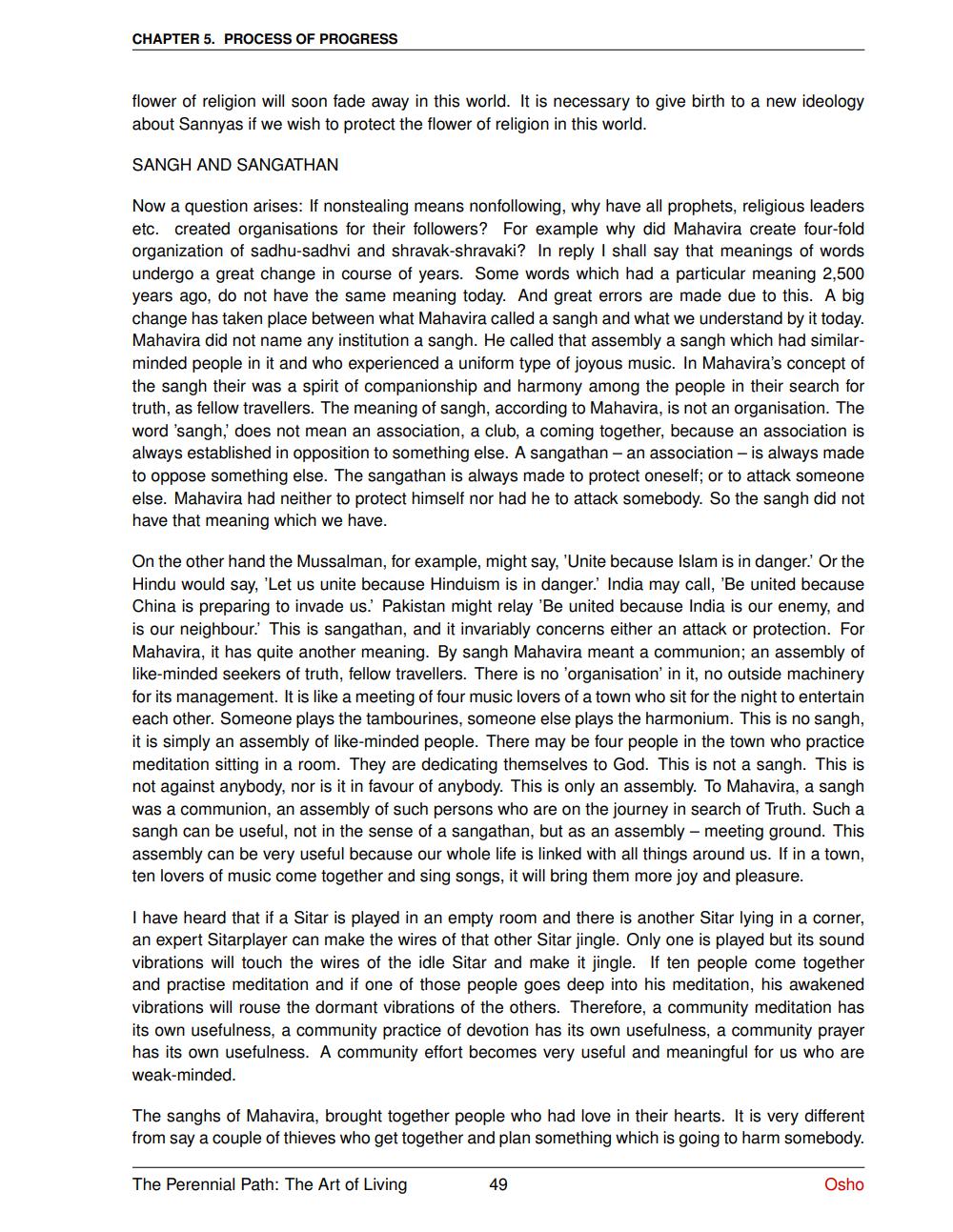________________
CHAPTER 5. PROCESS OF PROGRESS
flower of religion will soon fade away in this world. It is necessary to give birth to a new ideology about Sannyas if we wish to protect the flower of religion in this world.
SANGH AND SANGATHAN
Now a question arises: If nonstealing means nonfollowing, why have all prophets, religious leaders etc. created organisations for their followers? For example why did Mahavira create four-fold organization of sadhu-sadhvi and shravak-shravaki? In reply I shall say that meanings of words undergo a great change in course of years. Some words which had a particular meaning 2,500 years ago, do not have the same meaning today. And great errors are made due to this. A big change has taken place between what Mahavira called a sangh and what we understand by it today. Mahavira did not name any institution a sangh. He called that assembly a sangh which had similarminded people in it and who experienced a uniform type of joyous music. In Mahavira's concept of the sangh their was a spirit of companionship and harmony among the people in their search for truth, as fellow travellers. The meaning of sangh, according to Mahavira, is not an organisation. The word 'sangh, does not mean an association, a club, a coming together, because an association is always established in opposition to something else. A sangathan - an association - is always made to oppose something else. The sangathan is always made to protect oneself; or to attack someone else. Mahavira had neither to protect himself nor had he to attack somebody. So the sangh did not have that meaning which we have.
On the other hand the Mussalman, for example, might say, 'Unite because Islam is in danger. Or the Hindu would say, 'Let us unite because Hinduism is in danger.' India may call, 'Be united because China is preparing to invade us.' Pakistan might relay 'Be united because India is our enemy, and is our neighbour.' This is sangathan, and it invariably concerns either an attack or protection. For Mahavira, it has quite another meaning. By sangh Mahavira meant a communion; an assembly of like-minded seekers of truth, fellow travellers. There is no 'organisation' in it, no outside machinery for its management. It is like a meeting of four music lovers of a town who sit for the night to entertain each other. Someone plays the tambourines, someone else plays the harmonium. This is no sangh, it is simply an assembly of like-minded people. There may be four people in the town who practice meditation sitting in a room. They are dedicating themselves to God. This is not a sangh. This is not against anybody, nor is it in favour of anybody. This is only an assembly. To Mahavira, a sangh was a communion, an assembly of such persons who are on the journey in search of Truth. Such a sangh can be useful, not in the sense of a sangathan, but as an assembly - meeting ground. This assembly can be very useful because our whole life is linked with all things around us. If in a town, ten lovers of music come together and sing songs, it will bring them more joy and pleasure.
I have heard that if a Sitar is played in an empty room and there is another Sitar lying in a corner, an expert Sitarplayer can make the wires of that other Sitar jingle. Only one is played but its sound vibrations will touch the wires of the idle Sitar and make it jingle. If ten people come together and practise meditation and if one of those people goes deep into his meditation, his awakened vibrations will rouse the dormant vibrations of the others. Therefore, a community meditation has its own usefulness, a community practice of devotion has its own usefulness, a community prayer has its own usefulness. A community effort becomes very useful and meaningful for us who are weak-minded.
The sanghs of Mahavira, brought together people who had love in their hearts. It is very different from say a couple of thieves who get together and plan something which is going to harm somebody.
The Perennial Path: The Art of Living
49
Osho




